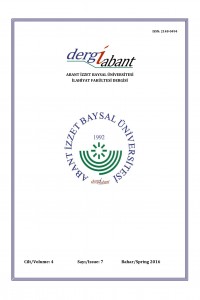Abstract
Determinism-voluntarism dichotomy about human behaviours has caused theoretic polarizations both in social sciences and theology. In sociology, the perceptive of positivist-naturalist social science which has produced the macro theories emphasizing structures and systems determining the actions of individuals is on the side of determinist camp; the perceptive of interpretative-humanist which has produced theories emphasizing a human subject building up the structures and systems is on the side of voluntarist camp. In the Kalam, it is possible to trace the same discussion about human behaviour. However, here, we notice that the issue is to be discussed regarding to the belief in destiny. In the Kalam, instead of structure, system, etc. which determines human behaviour in the sociology, God, omnipotent, is to take part in. In the Islamic studies, the destiny problem which implies that human behaviour has been determined by Allah in advance is issue of compromising with omnipotent of God and human willpower and, that is, religious and ethical responsibility of human.
References
- Abdülhamid, İrfan, “Cebriyye”, TDV İslâm Ansiklopedisi (DİA), VII, 205-208.
- Berger, Peter L ve Thomas Luckmann, Gerçekliğin Sosyal İnşası (çev. Vefa Saygın Öğütle), İstanbul: Paradigma Yayıncılık, 2008.
- Berger, Peter L, Kutsal Şemsiye (çev. Ali Coşkun), İstanbul: Rağbet Yayınları, 2005.
- Bolay, Süleyman Hayri, Felsefi Doktrinler ve Terimler Sözlüğü, Ankara: Akçağ Yayınları, 1996.
- Çelebi, İlyas, “Mutezile”, TDV İslâm Ansiklopedisi (DİA), XXXI, 391-401.
- Giddens, Anthony, Sosyal Teorinin Temel Problemleri (çev. Ümit Tatlıcan), İstanbul: Paradigma Yayınları, 2005.
- Giddens, Anthony, Sosyolojik Yöntemin Yeni Kuralları (çev. Ümit Tatlıcan ve Bekir Balkız), İstanbul: Paradigma Yayınları, 2003.
- Gölcük, Şerafeddin, Bâkıllânî ve İnsanın Fiilleri, Ankara: Türkiye Diyanet Vakfı Yayınları, 1997.
- Kızılçelik, Sezgin, Sosyoloji Teorileri II, Konya: Yunus Emre Limited Şirketi, 1994.
- Kirman, Mehmet Ali, Din Sosyolojisi Terimleri Sözlüğü, İstanbul: Rağbet Yayınları, 2004.
- Kobya, Murat, “Din Sosyolojisinde Dini Davranış Kuramları”, dergiabant (AİBÜ İlahiyat Fakültesi Dergisi), 3/6 (2015), 50-63.
- Kobya, Murat, Sosyal Bilimler ve Dini İlimlerde Davranış Kuramları, İstanbul: Rağbet Yayınları, 2012.
- Kobya, Murat, “Sosyal Bilimler ve Dini İlimlerde Davranış Tasavvuru”, Toplum Bilimleri Dergisi, 6/12 (2012), 41-56.
- Layder, Derek, Sosyal Teoriye Giriş (çev. Ümit Tatlıcan), İstanbul: Küre Yayınları, 2006.
- Poloma, Margaret M, Çağdaş Sosyoloji Kuramları (çev. Hayriye Erbaş), Ankara: Palme Yayıncılık, 2011.
- Slattery, Martin, Sosyoloji’de Temel Fikirler (edit. Ümit Tatlıcan ve Gülhan Demiriz), Sentez Yayıncılık, 2008.
- Swingewood, Alan, Sosyolojik Düşüncenin Kısa Tarihi (çev. Osman Akınhay), Ankara: Bilim ve Sanat Yayınları, 1998.
- Topaloğlu, Bekir, “Mâtürîdî”, TDV İslâm Ansiklopedisi (DİA), XXVIII, 151-157.
- Turhan, Kasım, Kelâm ve Felsefe Açısından İnsan Fiilleri, İstanbul: Marmara Üniversitesi İlahiyat Fakültesi Vakfı Yayınları, 2003.
- Wallace, Ruth A. ve Alison Wolf, Çağdaş Sosyoloji Kuramları (çev. Leyla Elburuz, M. Rami Ayas), İzmir: Punto Yayıncılık, 2004.
- Yavuz, Yusuf Şevki, “Kesb”, TDV İslâm Ansiklopedisi (DİA), XXV, 304-306.
- Yeprem, M. Saim, İrâde Hürriyeti ve İmâm Mâtürîdî, İstanbul: Marmara Üniversitesi İlahiyat Fakültesi Vakfı Yayınları, 1997.
Abstract
References
- Abdülhamid, İrfan, “Cebriyye”, TDV İslâm Ansiklopedisi (DİA), VII, 205-208.
- Berger, Peter L ve Thomas Luckmann, Gerçekliğin Sosyal İnşası (çev. Vefa Saygın Öğütle), İstanbul: Paradigma Yayıncılık, 2008.
- Berger, Peter L, Kutsal Şemsiye (çev. Ali Coşkun), İstanbul: Rağbet Yayınları, 2005.
- Bolay, Süleyman Hayri, Felsefi Doktrinler ve Terimler Sözlüğü, Ankara: Akçağ Yayınları, 1996.
- Çelebi, İlyas, “Mutezile”, TDV İslâm Ansiklopedisi (DİA), XXXI, 391-401.
- Giddens, Anthony, Sosyal Teorinin Temel Problemleri (çev. Ümit Tatlıcan), İstanbul: Paradigma Yayınları, 2005.
- Giddens, Anthony, Sosyolojik Yöntemin Yeni Kuralları (çev. Ümit Tatlıcan ve Bekir Balkız), İstanbul: Paradigma Yayınları, 2003.
- Gölcük, Şerafeddin, Bâkıllânî ve İnsanın Fiilleri, Ankara: Türkiye Diyanet Vakfı Yayınları, 1997.
- Kızılçelik, Sezgin, Sosyoloji Teorileri II, Konya: Yunus Emre Limited Şirketi, 1994.
- Kirman, Mehmet Ali, Din Sosyolojisi Terimleri Sözlüğü, İstanbul: Rağbet Yayınları, 2004.
- Kobya, Murat, “Din Sosyolojisinde Dini Davranış Kuramları”, dergiabant (AİBÜ İlahiyat Fakültesi Dergisi), 3/6 (2015), 50-63.
- Kobya, Murat, Sosyal Bilimler ve Dini İlimlerde Davranış Kuramları, İstanbul: Rağbet Yayınları, 2012.
- Kobya, Murat, “Sosyal Bilimler ve Dini İlimlerde Davranış Tasavvuru”, Toplum Bilimleri Dergisi, 6/12 (2012), 41-56.
- Layder, Derek, Sosyal Teoriye Giriş (çev. Ümit Tatlıcan), İstanbul: Küre Yayınları, 2006.
- Poloma, Margaret M, Çağdaş Sosyoloji Kuramları (çev. Hayriye Erbaş), Ankara: Palme Yayıncılık, 2011.
- Slattery, Martin, Sosyoloji’de Temel Fikirler (edit. Ümit Tatlıcan ve Gülhan Demiriz), Sentez Yayıncılık, 2008.
- Swingewood, Alan, Sosyolojik Düşüncenin Kısa Tarihi (çev. Osman Akınhay), Ankara: Bilim ve Sanat Yayınları, 1998.
- Topaloğlu, Bekir, “Mâtürîdî”, TDV İslâm Ansiklopedisi (DİA), XXVIII, 151-157.
- Turhan, Kasım, Kelâm ve Felsefe Açısından İnsan Fiilleri, İstanbul: Marmara Üniversitesi İlahiyat Fakültesi Vakfı Yayınları, 2003.
- Wallace, Ruth A. ve Alison Wolf, Çağdaş Sosyoloji Kuramları (çev. Leyla Elburuz, M. Rami Ayas), İzmir: Punto Yayıncılık, 2004.
- Yavuz, Yusuf Şevki, “Kesb”, TDV İslâm Ansiklopedisi (DİA), XXV, 304-306.
- Yeprem, M. Saim, İrâde Hürriyeti ve İmâm Mâtürîdî, İstanbul: Marmara Üniversitesi İlahiyat Fakültesi Vakfı Yayınları, 1997.
Details
| Primary Language | Turkish |
|---|---|
| Journal Section | Research Article |
| Authors | |
| Publication Date | June 15, 2016 |
| Published in Issue | Year 2016 Volume: 4 Issue: 7 |
Dergiabant is licensed under a Creative Commons Attribution-NonCommercial 4.0 International License (CC BY NC).

